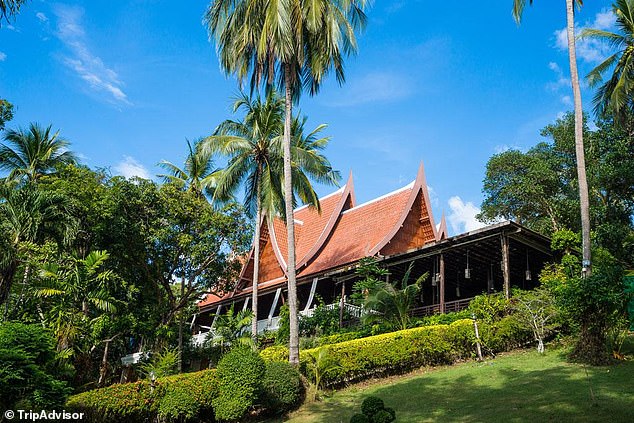
An American has been sued by an island resort in Thailand over a negative TripAdvisor review, authorities said Saturday, and could face up to two years in prison if found guilty.
Domestic tourism is still happening in Thailand, where coronavirus numbers are relatively low, with locals and expats heading to near-empty resorts – including Koh Chang island, famed for its sandy beaches and turquoise waters.
But a recent visit to the Sea View Resort on the island landed Wesley Barnes in trouble after he wrote unflattering online reviews about his holiday.
‘The Sea View Resort owner filed a complaint that the defendant had posted unfair reviews on his hotel on the Tripadvisor website,’ Colonel Thanapon Taemsara of Koh Chang police told AFP.
He said Barnes was accused of causing ‘damage to the reputation of the hotel’, and of quarreling with staff over not paying a corkage fee for alcohol brought to the hotel.
According documents shared online by Richard Barrow, a British expat travel blogger in Thailand, one review by Barnes in July said he encountered ‘unfriendly staff’ who ‘act like they don’t want anyone here’.
‘Unfriendly staff, no one ever smiles. They act like they don’t want anyone there. The restaurant manager was the worst…There are other hotels with better-friendlier staff.’
At least one review was posted in June on TripAdvisor accusing the hotel of ‘modern day slavery’ — which the site removed after a week for violating its guidelines.
‘Do not sleep here!’ a review said. ‘Don’t support modern day slavery of Thai people! The staff are unfriendly because of their management…’ part of the review read.
Barnes, who works in Thailand, was arrested by immigration police and returned to Koh Chang where he was briefly detained and then freed on bail.
The Sea View Resort said legal action was only taken because Barnes had penned multiple reviews on different sites over the past few weeks.
‘We chose to file a complaint to serve as a deterrent, as we understood he may continue to write negative reviews week after week for the foreseeable future,’ the hotel said, adding that staff had attempted to contact Barnes before filing the complaint.
In a five-page statement shared to Barrow, the hotel claimed three main reasons for the lawsuit.
‘He left fabricated stories on his reviews on TripAdvisor and Google that included xenophobic connotations, accusations of slavery and even comments that could mislead readers to associate our property with the Coronavirus.
‘He had been posting reviews roughly 1-2 weeks apart with obvious defamatory intentions.
‘Despite out multiple efforts to contact him to resolve this in an amicable way for well over a month, he chose to ignore use completely. He only replied to emails, messages on reviews sites, etc. once he had been notified of our complaint by authorities.’
But in another statement to Barrow, Barnes reportedly became upset with staff after they were allegedly unpleasant and because of a disagreement over pricing.
‘The staff were unfriendly at every turn. The night progressed and we started drinking on the beach right outside the restaurant,’ the statement said.
‘To avoid drinking and driving, we decided to eat at the restaurant at the hotel. We had our bottle of gin and was told it would cost an extra 500 baht [$15.80] to have it there.
‘We were shocked and complained a little to the server but my friend was willing to pay for it. The server told the manager we complained and he came over with an attitude. After having a little to drink and paying so much for the room, I got a little attitude back.
‘Eventually we were not charged. Before we left, my friend the peaceful one, wanted to tell the manager that he handled the situation wrong. The manager got upset and tried to argue with my friend,’ Barnes claimed.
Barnes did not immediately respond to requests for comment.
Thailand’s notorious anti-defamation laws have long drawn scrutiny from human rights and press freedom groups, who say powerful players use it as a weapon to stifle free expression.
The maximum sentence is two years in prison, along with a 200,000 baht ($6,300) fine.
Barrow noted in a Twitter post that ‘In most cases, defamation laws are good as they are there to protect us. But it is sometimes abused.’
‘To have someone arrested at their workplace for posting a negative review is surely a step too far. Does this now mean none of us should post one star hotel reviews in Thailand?’
Earlier this year, a Thai journalist was sentenced to two years in prison for posting a tweet referencing a dispute over working conditions at a chicken farm owned by the Thammakaset company.
Please wait…
RELATED ARTICLES
Did you like this information? Then please consider making a donation or subscribing to our Newsletter.
 RSS Feed
RSS Feed















 September 29th, 2020
September 29th, 2020  Awake Goy
Awake Goy 
 Posted in
Posted in  Tags:
Tags: 













